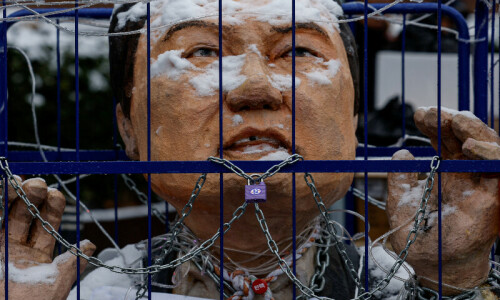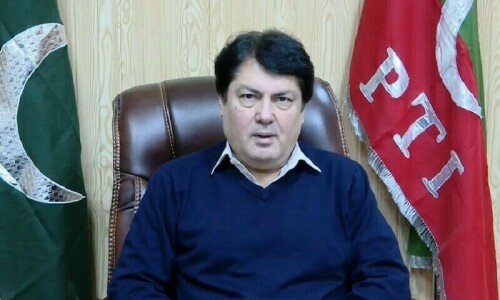ALGIERS: Divisions in Algeria’s opposition mean a third five-year term at the helm of OPEC member Algeria looks to be President Abdelaziz Bouteflika’s for the asking with the backing of the ruling elite.
An extension of his near-decade in charge of Africa’s third largest economy became possible this month when the energy exporting country ended a two term limit for the presidency, opening the way for him to stand in a 2009 election.
The Nov 12 constitutional change triggered an outcry from anti-Bouteflika Islamists and secularists who called the move a power grab likely to perpetuate economic failings widely blamed for unemployment, lack of housing and a national mood of gloom.
The opposition has embarked on a hunt for a consensus candidate to contest the election and end Bouteflika’s rule of Africa’s largest gas exporter, gradually rebuilding after a civil war in the 1990s between the army and Islamist militants.
“The time for a peaceful change has come,” Swiss-based opposition Islamist Mourad Dhina told El Khabar newspaper.
“The situation is unbearable. We can no longer expect the illegitimate institutions to do something.”
Bouteflika, 71, is in the final months of his second term, and although he has not said publicly whether he would like to stand for a third mandate most analysts say he will, pointing to loud calls for his candidacy by his close associates.
Ex-president Zeroual a contender?
A consensus opposition candidate has yet to emerge, partly because the disparate groups agree on little apart from their opposition to the continued rule of the former foreign minister and their common demand for tougher action against corruption.
Some of his foes are Islamists who want the country of 34 million governed under purist Islamic rule and cultural norms.
Others include Francophone secularists or Berber minority campaigners who seek increased political and cultural freedoms.
One name that repeatedly surfaces as a potential challenger in newspaper commentary is that of Lamine Zeroual, a strong-minded military man who was president from 1994-1999.
Respected by nationalists, he might prove unacceptable to Islamists since his presidency coincided with the height of the civil war. He has yet to comment on calls for his candidacy.
Ideology is not the only hurdle.
Many in the opposition are demoralised because they believe that Bouteflika’s likely candidature has won the tacit backing of the secretive military group known as “le pouvoir” (the power) which has dominated Algerian politics since independence.This elite of men in their late 60s and 70s in key positions of power tend to be veterans of the 1954-62 war against colonial France and as a result enjoy political legitimacy under the status quo, which they do not wish to see changed.
Newspapers recently reported Prime Minister Ahmed Ouyahia, who heads a political party seen as close to the military, as telling supporters: “The opposition will never take power in Algeria – well I wouldn’t say never, but not for a long time.”
Another obstacle is apathy: despite widespread discontent about housing and joblessness, efforts by opposition thinkers to stir up debate about the election have foundered on public disinterest in the formal political process.
With some Islamist radicals banned from public life under a law outlawing “manipulation” of religion for political ends, and the weak parliament seen as a tool of the executive branch, many people say they do not believe they have a say in governance.
“We haven’t sufficiently appreciated how deep people’s disengagement has been,” said opposition writer Baya Gacemi.
“That’s the reality and it’s sad.”
Opposition may boycott election
The opposition figures seen as most likely to stand against Bouteflika are lightweights belonging to a group of parties who are seen as no real threat by the establishment, experts say.
Some opponents already seem resigned to failure.
“Elections are arranged in advance – a game of no interest to me or any Algerian,” former prime minister Sid Ahmed Ghozali told El Watan newspaper. Others are more upbeat.
“It’s possible for the opposition to agree on a consensus candidate simply because the social situation is so grave,” said Lahouari Addi, a French-based sociologist, adding he would back either Zeroual or another retired general, Rachid Benyelles.Many expect the opposition to settle for a boycott of the polls, to undermine the legitimacy of a Bouteflika third term.
Whether he stands or not, more social unrest is a risk because of delays in a big reconstruction push to create new homes, motorways, universities and hospitals, analysts say.
“What’s a real threat these days is this tendency to chaos driven by people who are thirsty for revenge, bereft of clear signs of change and intent on destroying everything that stands for the predatory regime responsible for their misery,” former prime minister Ahmed Benbitour told El Watan.—Reuters














































Dear visitor, the comments section is undergoing an overhaul and will return soon.